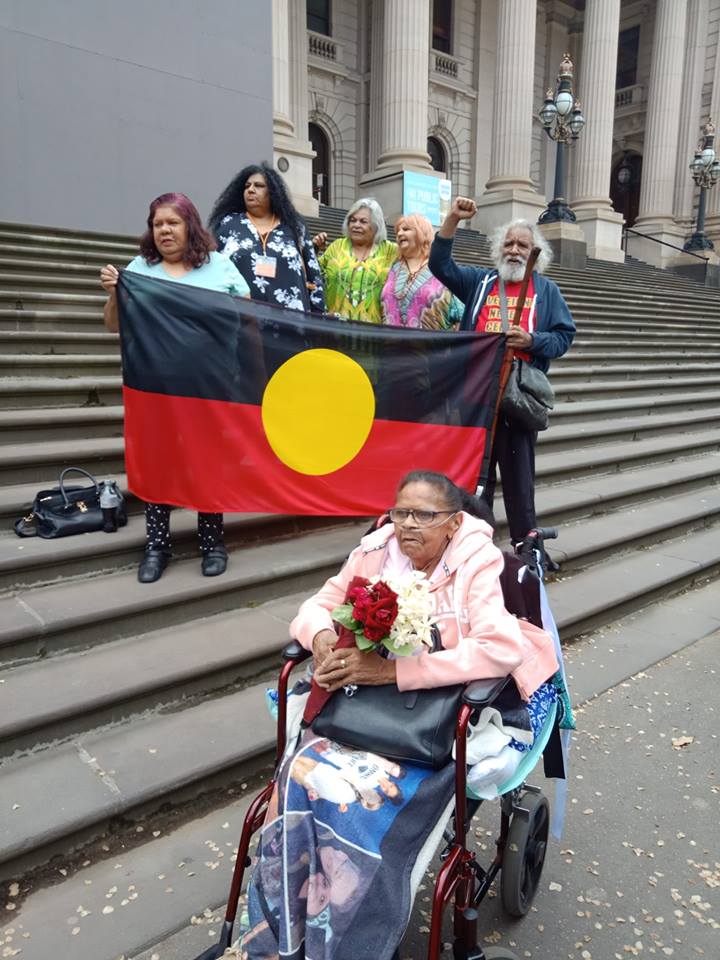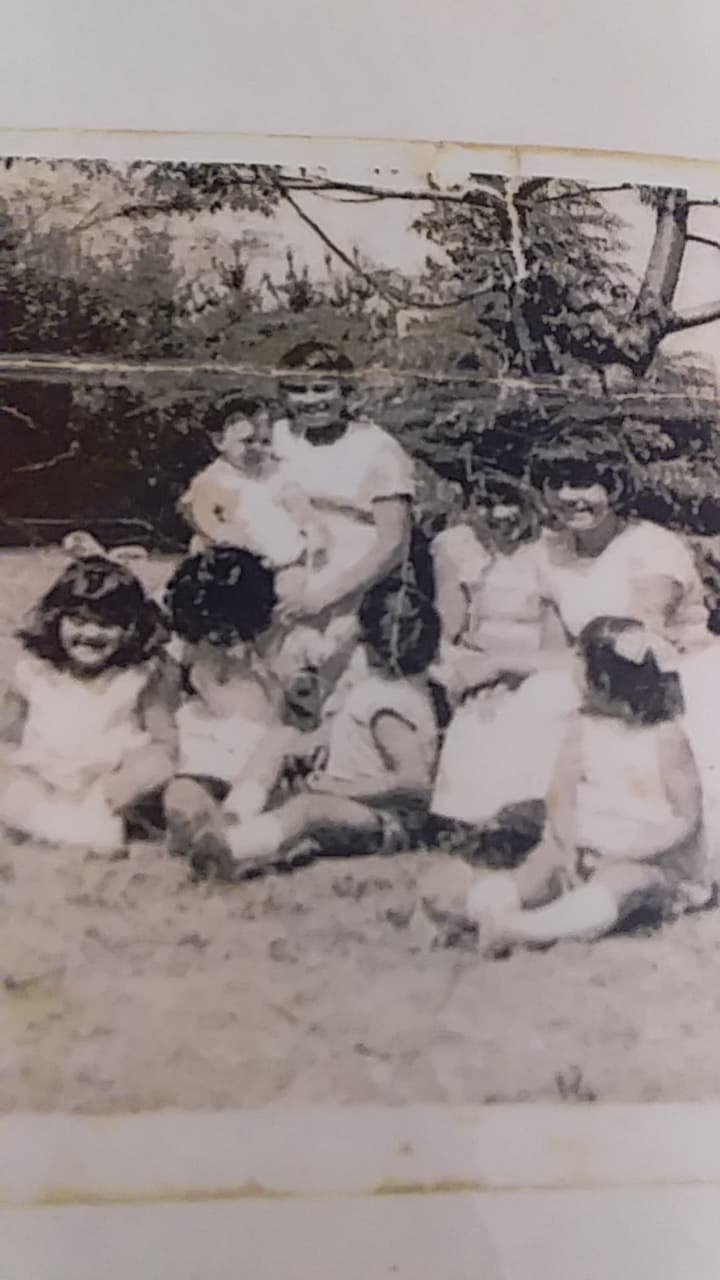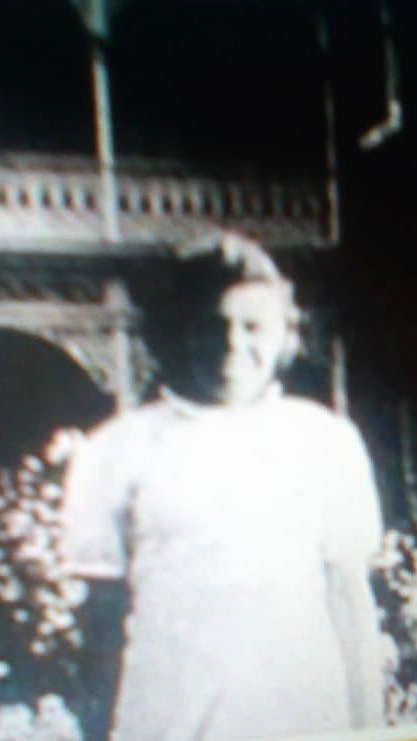Aunty Lyn Austin sounds resigned as she contemplates the 11th anniversary of Kevin Rudd’s apology.
Herself removed when she was a young girl, Aunty Lyn has been a tireless campaigner for justice for the Stolen Generations over the years — not only since the National Apology, but since the Bringing Them Home report was tabled in Federal Parliament in 1997.
Yet Victoria, where Aunty Lyn calls home, is the only state not to offer some kind of redress scheme to Aboriginal elders removed in this state. The Victorian government — most recently under former Aboriginal Affairs Minister Natalie Hutchins — refusing to offer compensation, despite ongoing advocacy from Aboriginal community groups. Yet Aunty Lyn is determined to, once again, tell her story to anyone who will listen.
Yet Aunty Lyn is determined to, once again, tell her story to anyone who will listen.

Aunty Lyn (left) with protesters at Victorian Parliament House last year (Supplied) Source: Supplied
“I was ten when I was taken from Dimboola to a farm in Shelford, to a non-Indigenous family," she says.
"They had other Indigenous children there that they’d foster, and they also had adopted children on that property.”
Aunty Lyn recalls the day she was removed, in a black EH Holden, and was driven to the isolated farm where she was forced to do chores, including cooking, cleaning and looking after the other fostered and adopted children.
“I hardly had any contact with my family, I used to cry for my mother sometimes," she recalls.
Aunty Lyn was also physically and sexually abused, in what she describes as “my living nightmare.”
“As punishment the old lady used to starve me. I’d get to school and I’d be having to pinch sandwiches out of someone’s lunch box because I was bloody hungry!”
“She [also] had all these straps all lined up in the laundry, we’d get flogged with those.”
Lyn worked at the farm between age 10 to 17 until she left school, and during this time she has very little contact with her family.
“I think I saw my mother once or twice over those seven years.” Lyn suspects they were sent to the farm deliberately to be , not an uncommon experience for many Aboriginal children removed during this time.
Lyn suspects they were sent to the farm deliberately to be , not an uncommon experience for many Aboriginal children removed during this time.

Aunty Lyn (back) with the children on the farm in Shelford (Supplied) Source: Supplied
“I felt like I was just a slave,” she says.
Lyn also recounts how the farm family would put on garden parties and hold barn dances, and that they were well known in the town.
“Everyone would say ‘oh, what wonderful good white people, good Christian people, looking after all these little black kids'. But no one really knew what the hell was going on, on the farm. No one would have believed us anyway.”
As an adult, her removal and the abuse she suffered has had a massive impact.
When Aunty Lyn left the farm as a 17 year-old, she “got into the wrong crowd” and ended up in a number of violent relationships.
She says of those relationships, that “you think that’s normal because of the violence and the abuse on the farm.”
It wasn’t until later in life that she was able to break what she calls “a cycle” of violence, and today, says that telling her story helps her to overcome the trauma.
“It gives me some comfort in talking, but then it makes me feel sad, because we are just reliving that trauma all the time. There seems to be no end or no closure for us, because we are still retelling our stories, reliving our trauma all the time.”
The removal also impacted her ability to connect with her culture.
“When I left the farm I struggled to be with my mob and family. I couldn’t connect to the community and couldn’t connect to my culture because I was taught white man’s way.”
She describes the distance between her family members which continues to this day.
Aunty Lyn also describes how she has been impacted by intergenerational trauma due to repeated child removals.
Her own mother was removed and placed in Ballarat Orphanage, with the impact trickling down to her own children and grandchildren, making her grandson as fourth generation of removed children, who now she is raising. Aunty Lyn says this intergenerational trauma this is why compensation is required, as people are struggling in poverty.
Aunty Lyn says this intergenerational trauma this is why compensation is required, as people are struggling in poverty.

Aunty Lyn's mother outside of Ballarat Orphanage where she was removed to. (Supplied) Source: Supplied
“People can get compensated for other things, why haven’t they set up a package of some sort for Stolen Generations? If they don’t want to fork out any payment, [at least] give some material aid.”
Aunty Lyn also points out that the 54 recommendations contained in the Bringing the Home report are yet to be fully implemented, and despite it being the 11th anniversary of Kevin Rudd’s apology, little has happened to help those most in need.
“That’s why I’m not attending any anniversary apology events [this year], because I think ‘why the hell am I going to sit there [with] everyone walking around with a cup of tea and a sandwich, and a biscuit on my plate, putting on a fake smile thinking everything is sweet, when deep down it’s not.”
With the Federal Labor government promising this time last year to offer compensation to Aboriginal Elders removed in both the ACT and Northern Territory, Victoria looks set to remain the only jurisdiction not to offer payment.
And with the Elders growing old and passing away, as Aunty Lyn suggests, perhaps the Victorian Government is waiting until there is no one left at all.
“It seems like they want everyone to go along with the niceties and next year comes around again. When does it end? They are waiting to wipe us all out.”
Ali MC (Alister McKeich) is a writer, photographer and legal professional who holds a Masters in Human Rights Law. His work documents global human rights issues, and he has had the privilege of working with a number of Aboriginal communities here and internationally. Follow



